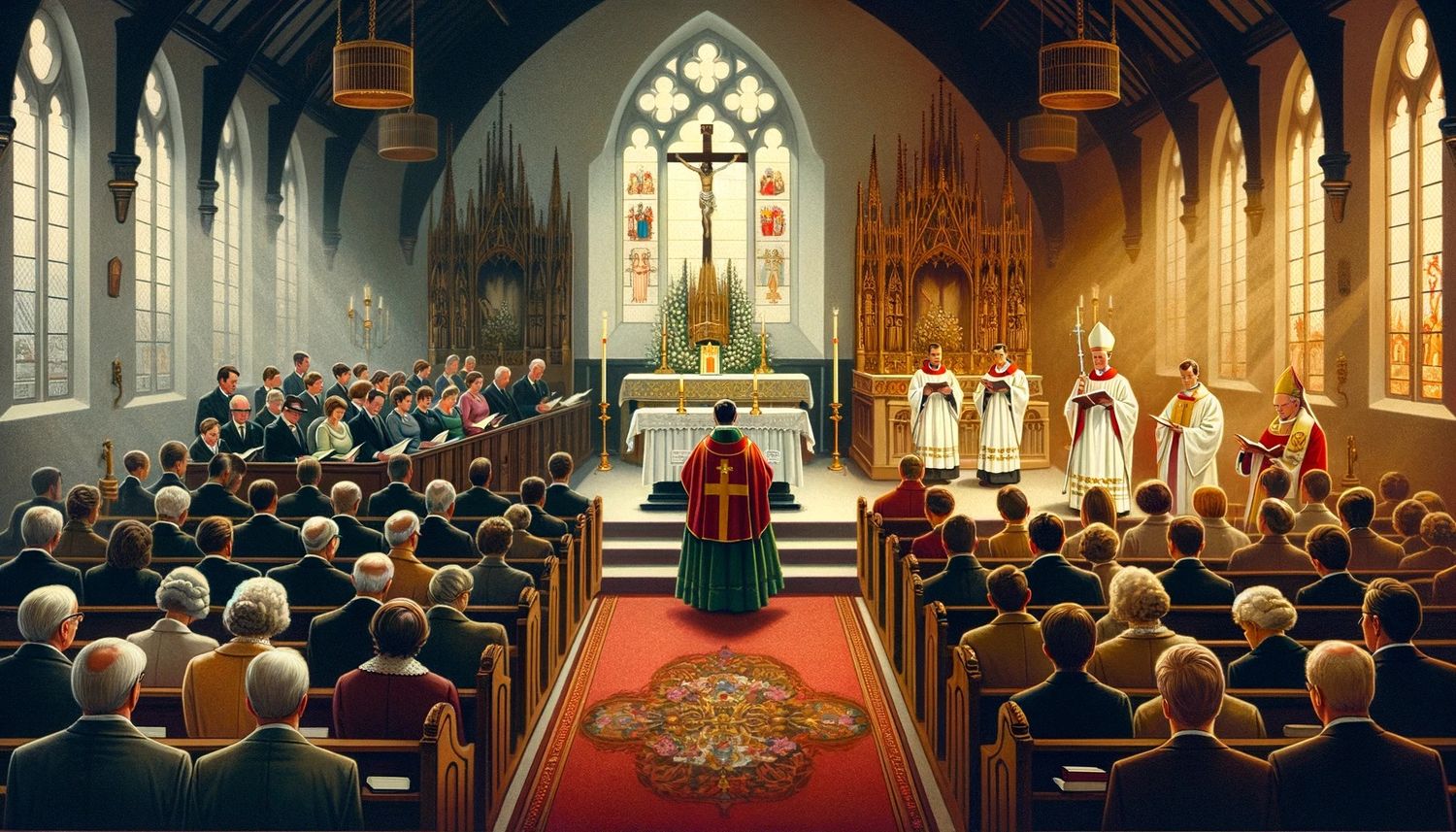Home>Theology and Spirituality>What Is Anglican Communion


Theology and Spirituality
What Is Anglican Communion
Published: February 25, 2024
Peter Smith, Editorial Director at Christian.net, combines deep insights into faith, politics, and culture to lead content creation that resonates widely. Awarded for his contributions to religious discourse, he previously headed a major organization for religious communicators, enhancing dialogue on faith's societal impacts.
Discover the theology and spirituality of the Anglican Communion, its beliefs, practices, and global impact. Explore the rich history and diverse traditions of Anglicanism.
(Many of the links in this article redirect to a specific reviewed product. Your purchase of these products through affiliate links helps to generate commission for Christian.net, at no extra cost. Learn more)
Table of Contents
Introduction
The Anglican Communion, a global association of churches, is a significant presence in the world of Christianity. With a rich history, diverse beliefs, and a global reach, the Anglican Communion plays a vital role in shaping the spiritual landscape of many nations.
Established in the 16th century, the Anglican Communion has evolved into a diverse and dynamic entity, encompassing a wide array of traditions, liturgies, and theological perspectives. Its roots can be traced back to the Church of England, which was established when King Henry VIII separated from the Roman Catholic Church in the 1530s. This pivotal moment in history marked the beginning of a distinct Anglican identity, characterized by a unique blend of Catholic and Protestant influences.
The Anglican Communion is known for its commitment to scripture, tradition, and reason, often referred to as the "three-legged stool" of Anglican theology. This approach to faith emphasizes the importance of balancing scriptural authority with tradition and reason, allowing for a nuanced and inclusive understanding of Christian doctrine.
With a global presence spanning across diverse cultures and societies, the Anglican Communion embraces a wide spectrum of beliefs and practices. From high church traditions with elaborate liturgical rituals to low church expressions marked by simplicity and informality, the Anglican Communion accommodates a broad range of worship styles and theological interpretations.
At its core, the Anglican Communion is united by a common allegiance to the historic creeds, including the Nicene and Apostles' Creeds, which serve as foundational statements of faith across its member churches. This shared commitment to essential Christian doctrines provides a unifying force amidst the diversity of cultural and theological expressions within the communion.
As we delve deeper into the history, beliefs, practices, structure, and global impact of the Anglican Communion, we will gain a deeper understanding of its significance and influence in the contemporary world. This exploration will shed light on the challenges and controversies that have shaped the communion's journey, offering valuable insights into its ongoing evolution and relevance in the 21st century.
Read more: Who Can Take Communion In An Anglican Church
History of Anglican Communion
The history of the Anglican Communion is deeply intertwined with the complex tapestry of religious, political, and cultural developments that unfolded in England and beyond. Its origins can be traced back to the tumultuous era of the English Reformation in the 16th century. The catalyst for the formation of the Anglican Communion can be found in the actions of King Henry VIII, whose desire to annul his marriage to Catherine of Aragon led to a decisive break from the authority of the Roman Catholic Church.
In 1534, the Act of Supremacy declared the English monarch as the supreme head of the Church of England, marking a pivotal moment in the establishment of a distinct ecclesiastical identity. This move severed the ties with the papacy and set the stage for the emergence of a reformed yet catholic expression of Christianity in England.
The subsequent reign of Edward VI witnessed significant doctrinal and liturgical changes, as Protestant influences gained prominence within the Church of England. The Book of Common Prayer, introduced during this period, became a defining feature of Anglican worship, reflecting the synthesis of traditional Catholic elements with Protestant theological emphases.
The accession of Queen Elizabeth I in 1558 brought a measure of stability to the religious landscape, as the Elizabethan Settlement sought to navigate the tensions between Catholic and Protestant factions within the church. This delicate balance, characterized by a broad theological latitude and a comprehensive liturgical framework, laid the groundwork for the inclusive ethos that would come to define Anglicanism.
The subsequent centuries witnessed the expansion of Anglicanism beyond the shores of England, as colonial ventures and missionary endeavors spread the influence of the Church of England to distant corners of the globe. The establishment of dioceses, the translation of the Book of Common Prayer into indigenous languages, and the adaptation of Anglican worship to diverse cultural contexts contributed to the organic growth of the communion.
The 20th century brought further developments, including the Lambeth Conference, a decennial gathering of bishops from across the communion, and the growing recognition of the autonomy and diversity of the constituent provinces. The ordination of women to the priesthood and episcopate, alongside ongoing dialogues with other Christian traditions, underscored the evolving nature of Anglicanism in response to contemporary challenges and opportunities.
This historical overview illuminates the intricate journey of the Anglican Communion, marked by a continuous process of adaptation, dialogue, and self-discovery. The interplay of historical events, theological currents, and global expansion has shaped the communion into a vibrant and multifaceted expression of Christian faith, with a rich tapestry of traditions and perspectives that continue to evolve in the present day.
Beliefs and Practices
The beliefs and practices within the Anglican Communion reflect a diverse spectrum of theological perspectives and worship traditions. At the heart of Anglican identity lies a commitment to the "three-legged stool" of scripture, tradition, and reason, which serves as the foundation for theological reflection and spiritual formation.
Scripture
Anglicans hold the Bible as the primary source of authority and guidance for faith and practice. The scriptures are revered as the inspired word of God, containing the revelation of God's redemptive plan for humanity. While affirming the centrality of scripture, Anglicans interpret the Bible within the context of tradition and reason, allowing for a nuanced understanding of its teachings.
Tradition
The Anglican tradition encompasses a rich heritage of liturgical practices, theological writings, and historical precedents that inform the communal life of the church. Drawing from the early church fathers, the creeds, and the wisdom of the Christian tradition, Anglicans seek to maintain continuity with the historic faith while engaging with contemporary challenges and insights.
Reason
Reason, as a pillar of Anglican theology, invites critical engagement with scripture and tradition, fostering a thoughtful and intellectually robust approach to theological inquiry. This emphasis on reason encourages dialogue, intellectual exploration, and the integration of faith with the complexities of human experience and knowledge.
Sacraments
Central to Anglican worship are the sacraments, particularly the Eucharist and baptism. The celebration of the Eucharist, or Holy Communion, holds a prominent place in Anglican liturgy, embodying the real presence of Christ and the communal sharing in the divine life. Baptism, as the rite of initiation into the Christian community, signifies the incorporation of individuals into the body of Christ.
Prayer and Worship
Anglican worship is characterized by a rich tapestry of liturgical expressions, drawing from the Book of Common Prayer and other authorized liturgical resources. The rhythm of daily prayer, the observance of liturgical seasons, and the use of hymnody and sacred music contribute to a vibrant and reverent worship environment that engages the senses and nurtures spiritual devotion.
Social Justice and Mission
Grounded in the gospel imperative to love God and neighbor, Anglicans are actively involved in social justice initiatives and mission endeavors. The pursuit of peace, reconciliation, and advocacy for the marginalized are integral aspects of Anglican identity, reflecting a commitment to embodying the transformative love of Christ in the world.
Read more: How Does An Anglican Convert To Catholicism
Diversity and Inclusivity
The Anglican Communion embraces a broad spectrum of theological perspectives and cultural expressions, fostering a spirit of inclusivity and diversity. This ethos is reflected in the communion's engagement with ecumenical dialogues, interfaith relations, and the celebration of the myriad gifts and contributions of its global membership.
The beliefs and practices of the Anglican Communion, characterized by a dynamic interplay of scripture, tradition, and reason, underscore its enduring relevance and adaptability in a rapidly changing world. This multifaceted tapestry of faith and worship continues to inspire and nurture communities of believers across diverse contexts, inviting all to encounter the transformative power of God's love.
Structure and Leadership
The Anglican Communion, renowned for its global reach and diverse cultural representation, operates within a unique structure that reflects its commitment to both autonomy and interdependence. At the core of this structure is the concept of a "communion of churches," wherein individual provinces maintain a degree of self-governance while remaining interconnected through shared traditions, doctrinal affirmations, and collaborative decision-making processes.
Provincial Autonomy and Interdependence
Each province within the Anglican Communion, encompassing geographical regions or national entities, exercises a significant degree of autonomy in matters of governance, liturgy, and theological expression. This autonomy is manifested through the provincial synods or councils, which serve as deliberative bodies responsible for discerning matters of doctrine, discipline, and mission within their respective contexts. This emphasis on provincial autonomy allows for the contextualization of Anglican identity within diverse cultural and social landscapes, fostering a sense of ownership and relevance at the local level.
Simultaneously, the communion maintains a robust framework for interdependence and mutual accountability among its member churches. The Lambeth Conference, a decennial gathering of bishops from across the communion, serves as a forum for dialogue, discernment, and collective discernment on matters of shared concern. Additionally, the Anglican Consultative Council, comprising bishops, clergy, and laity, provides a platform for fostering collaboration, coordinating mission initiatives, and addressing global challenges that transcend provincial boundaries.
Episcopacy and Synodical Governance
The episcopal polity, characterized by the leadership of bishops within the church hierarchy, forms a foundational element of Anglican ecclesiology. Bishops, as guardians of apostolic succession and spiritual overseers within their dioceses, play a pivotal role in preserving the unity of the communion and upholding its doctrinal integrity. The office of the Archbishop of Canterbury, as the symbolic head of the communion, embodies a unifying presence and spiritual leadership, fostering communion-wide solidarity and dialogue.
In tandem with episcopal leadership, synodical governance structures, inclusive of clergy and laity, contribute to the discernment of key decisions and the formulation of policies within the provinces. This synodical model reflects the Anglican commitment to shared decision-making and the recognition of the diverse gifts and perspectives present within the body of Christ. The collaborative engagement of bishops, clergy, and laity in synodical processes underscores the participatory nature of Anglican governance, affirming the priesthood of all believers and the value of collective discernment.
Read more: How Is Anglican Different From Baptist
Global Instruments of Unity and Collaboration
The Instruments of Communion, comprising the Archbishop of Canterbury, the Lambeth Conference, the Anglican Consultative Council, and the Primates' Meeting, serve as focal points for fostering unity, dialogue, and collaborative action within the communion. These instruments provide avenues for addressing theological, social, and missional challenges, promoting mutual understanding, and nurturing a sense of shared identity and purpose across the diverse provinces.
The structure and leadership of the Anglican Communion, characterized by a delicate balance of autonomy and interdependence, episcopal and synodical governance, and global instruments of unity, reflect its commitment to embodying the unity of the body of Christ amidst the rich tapestry of cultural, theological, and contextual diversities. This dynamic framework enables the communion to navigate complex issues, engage in transformative mission, and bear witness to the reconciling love of God in a world marked by profound interconnectedness and diversity.
Global Presence and Influence
The Anglican Communion, with its expansive global presence, exerts a profound influence on the spiritual, social, and cultural landscapes of numerous nations. Spanning across diverse continents, regions, and societies, the communion's impact is characterized by its multifaceted engagement with issues of justice, reconciliation, and holistic mission.
One of the defining features of the Anglican Communion's global presence is its commitment to mission and social justice. From inner-city neighborhoods to remote rural communities, Anglican churches and organizations are actively involved in addressing pressing social concerns, including poverty, healthcare disparities, and education. Through initiatives focused on community development, humanitarian aid, and advocacy for marginalized populations, the communion demonstrates a tangible commitment to embodying the transformative love of Christ in tangible and impactful ways.
Furthermore, the Anglican Communion's influence extends to the realm of interfaith dialogue and ecumenical relations. Engaging in constructive conversations with diverse religious traditions, the communion seeks to foster mutual understanding, respect, and cooperation. By promoting interfaith collaboration on shared concerns such as environmental stewardship, peace-building, and humanitarian relief, the communion contributes to the cultivation of harmonious and inclusive societies marked by a spirit of cooperation and solidarity.
In addition to its social and interfaith engagements, the Anglican Communion wields influence in the realm of theological reflection and ethical discernment. Theological scholars, clergy, and laity within the communion contribute to global conversations on issues such as human rights, environmental ethics, and the intersection of faith and public life. Through publications, conferences, and educational initiatives, the communion enriches the broader theological discourse, offering valuable insights and perspectives that resonate across diverse cultural and intellectual contexts.
The global presence and influence of the Anglican Communion, characterized by its holistic mission engagement, commitment to interfaith dialogue, and theological contributions, underscore its enduring relevance and impact in a world marked by interconnectedness and diversity. As the communion continues to navigate the complexities of the 21st century, its global presence serves as a beacon of hope, compassion, and thoughtful engagement, inspiring individuals and communities to embrace the transformative message of God's love and grace.
Challenges and Controversies
The Anglican Communion, despite its rich heritage and global reach, has grappled with a myriad of challenges and controversies that have tested its unity and coherence. One of the most significant issues that have sparked internal tensions within the communion is the debate over human sexuality and the ordination of LGBTQ+ individuals to the priesthood and episcopate. This contentious topic has led to deep divisions among member churches, with contrasting theological perspectives and cultural sensitivities shaping the discourse. The struggle to find a consensus on matters related to human sexuality has strained the bonds of communion, prompting profound soul-searching and dialogue on the nature of unity amidst diversity.
In addition to the internal debates on human sexuality, the Anglican Communion has faced external pressures stemming from geopolitical and social upheavals. The intersection of faith with political conflicts, economic disparities, and humanitarian crises has presented complex challenges for the communion, as it seeks to navigate the complexities of global realities while upholding its commitment to justice, peace, and reconciliation. The communion's response to issues such as religious persecution, refugee crises, and environmental degradation has been a source of both inspiration and contention, reflecting the tensions inherent in balancing prophetic witness with diplomatic prudence.
Furthermore, the Anglican Communion has encountered theological controversies related to biblical interpretation, ecclesial authority, and ethical discernment. Disagreements over doctrinal emphases, liturgical innovations, and the nature of interprovincial relationships have engendered robust debates and occasional ruptures within the communion, challenging its capacity to maintain a cohesive identity amidst diverse theological expressions. The tension between upholding tradition and embracing contextual relevance has been a recurring theme in the communion's engagement with theological controversies, underscoring the complexities of navigating the dynamic interplay of continuity and adaptation.
Amidst these challenges and controversies, the Anglican Communion continues to grapple with the imperative of fostering unity without uniformity, embracing diversity without division, and engaging in dialogue without compromise. The communion's journey through these tumultuous terrains reflects the ongoing quest for a deeper understanding of what it means to be a communion of churches in a world marked by profound complexities and rapid transformations. As the communion navigates these challenges and controversies, it remains committed to the pursuit of mutual understanding, respectful dialogue, and collective discernment, seeking to embody the reconciling love of Christ amidst the complexities of the contemporary world.
Conclusion
In conclusion, the Anglican Communion stands as a vibrant and multifaceted expression of Christian faith, encompassing a rich tapestry of traditions, beliefs, and global influences. From its historical roots in the English Reformation to its present-day engagement with complex theological, social, and ethical challenges, the communion embodies a dynamic interplay of unity and diversity, tradition and adaptation, and global interconnectedness.
The journey of the Anglican Communion, marked by a commitment to scripture, tradition, and reason, reflects a nuanced and inclusive approach to theological reflection and spiritual formation. Its diverse worship traditions, sacramental practices, and social justice initiatives underscore a holistic and transformative vision of Christian discipleship, inviting individuals and communities to encounter the redemptive message of God's love in tangible and impactful ways.
The communion's structure, characterized by provincial autonomy and global interdependence, episcopal and synodical governance, and instruments of unity and collaboration, exemplifies a delicate balance of local relevance and global solidarity. This dynamic framework enables the communion to navigate complex issues, engage in transformative mission, and bear witness to the reconciling love of God in a world marked by profound interconnectedness and diversity.
As the Anglican Communion continues to grapple with internal tensions, external pressures, and theological controversies, it remains committed to the pursuit of unity amidst diversity, dialogue amidst differences, and discernment amidst complexities. Its global presence and influence, characterized by a holistic mission engagement, commitment to interfaith dialogue, and theological contributions, underscore its enduring relevance and impact in a world marked by interconnectedness and diversity.
In the midst of the challenges and controversies that have shaped its journey, the Anglican Communion remains a beacon of hope, compassion, and thoughtful engagement, inspiring individuals and communities to embrace the transformative message of God's love and grace. Its enduring legacy, rooted in a profound commitment to the gospel imperative of love, justice, and reconciliation, continues to shape the spiritual landscape of the contemporary world, inviting all to participate in the ongoing story of God's redemptive work in the world.












